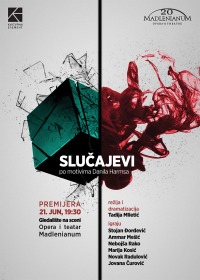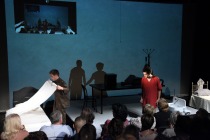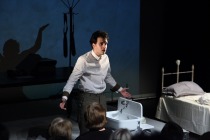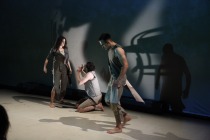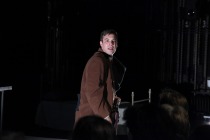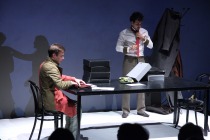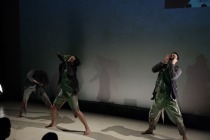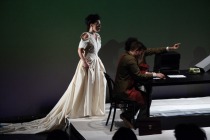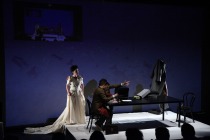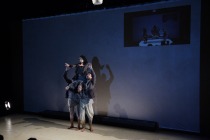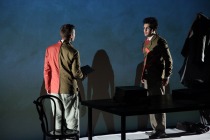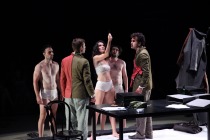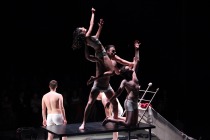Based on motifs of Daniil Kharms
INCIDENCES
Book & Buy TicketsThis play is performed in a different way than what you expect. First of all, the play is divided in two sides, the left and the right. Further, you choose which side to watch and your experience will be different depending on the choice you have made. There is a dance performance on one side and a drama performance on the other. Each side has its own story. To fully understand one side, you have to follow the other as well. What do you like more? Choreodrama dance or dramatic text? In the end you will realize that these two performances, in fact, live only as one whole and that any other perceiving is wrong. Isn’t it the same in life? We write something off at first glance, while we sometimes do not see an obvious thing though it is directly in front of us.
The play combines a series of theatre motifs. First of all, the core of the plot is in duodrama acting. Then, the choreo -dramatic dance conveys the complement, clarification and improvement of the drama text that we hear and simultaneously it brings its own separate theme which is equal to the drama. Afterwards here is the musical- opera aspect as well which completes and improves the whole picture. In all that we also have the elements of a shadow theatre and the modern audio- visual scene solutions as well which eventually consolidate all aspects into one big picture, one scene and one story. The entire conceptual solution of the performance derives from life and work of Daniil Kharms whose Incidences have been an exceptional and lasting inspiration for creating such a modern concept of performance.
Director and Dramaturg: Tadija Miletic
Scenographer: Miras Vuksanovic
Costume Designer: Tijana Sicevic
Stage Movement: Tamara Antonijevic Spasic
Composer: Jug Markovic
Lighting Designer: Srdjan Jovanovic
Right man - Stojan Djordjevic
Left man - Ammar Mesic
Shadow - Marija Kosic
Shadow - Novak Radulovic
Shadow - Nebojsa Rako
Musical ensemble:
Jovana Curovic (soprano)
Nevena Stanic (contrabass)
Ana Marinkovic (flute)
Rastko Uzunovic (clarinet)
Production: Vuk Miletic
Stage Manager: Vesna Curcic Petrovic
Organizer: Milica Radumilo
Assistant Scenographer: Jasna Saramandic
The basic idea for this performance creation lies before all in the historical context in which the collection of stories Incidences was originally created. A Russian writer Daniil Kharms (1905 –1942), described as a predecessor of the Theatre of the Absurd, aligned with the surrealists and avant- garde authors, lived and wrote in Soviet, Bolshevik Russia at a time of brutal repression, which used to deal with unlike- minded without much hesitation or delay. With this in mind, it is quite certain that much of that what Kharms wanted to convey remained trapped in impossibility to speak your mind freely and openly. With this play, we ask questions and offer answers to them as well. What in fact did Kharms want to tell us? What is genuinely hidden behind his thoughts, stories and comments? What is hidden behind that absurd monologue, the surreal conversation and the actions he deals with in his works, what would exactly be those words that would convey what he saw, heard or knew? What are exactly stories about questions, poverty, neglect, non-understanding, wrong, but strong ambition, vanity, greediness, and different characters? With this play we explore the concept which could impose the question whether in this dramatization Kharms is the writer of symbolism and not of the absurdity. By surveying details of his life and deeds, it is easy to conclude that the basic concept he was led by was fun and division. Division into these ones and those ones, division into right ones and wrong ones. Within those questions we have also formed a topic of this play which can rightly be called an experimental theatre and in which we ask: What have we done wrong and allowed to be divided, what divides us here and today and distracts us from the right way without clearly realising that, how big is our role in that, how far we have and have not moved away from Kharms’ messages from the beginning of the last century and most importantly, how could we allow that to happen at all?
Tadija Miletic, Director and Dramaturg

